Waste oil from car and motorbike repair shops is hazardous waste that needs to be collected, classified and treated according to the provisions of Circular No. 36/2015/TT-BTNMT of the Ministry of Natural Resources and Environment on "Management of hazardous waste". However, the management of this waste source has not been closely monitored and properly treated by competent authorities. In addition, the collection of waste oil, putting it into rudimentary furnaces, distilling it into poor quality oil and selling it "illegally" on the market, shows many signs of violating the law. Reporters recorded the chaotic situation of buying and selling waste oil in Ho Chi Minh City and Dong Nai.
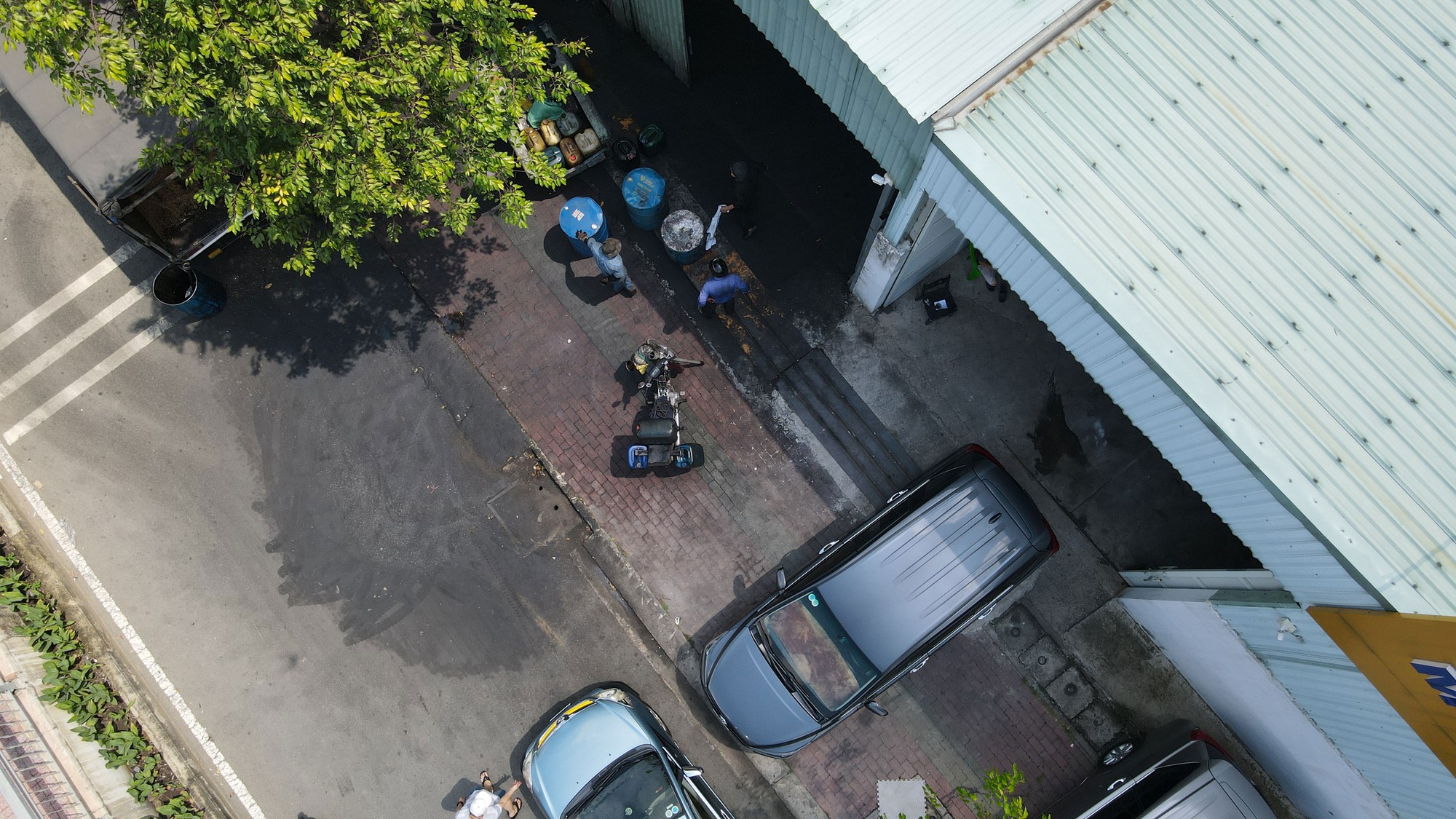
A large waste oil collection point on Ha Huy Giap Street, Thanh Xuan Ward, District 12, Ho Chi Minh City
ABUNDANT SUPPLY FOR ILLEGAL OIL REFINERS
After many days of monitoring illegal waste oil recycling facilities (WHE) on Song May 4 Road (Bac Son Commune, Trang Bom District, Dong Nai Province), we recorded that every day, there are about 20 large-tonnage trucks entering and exiting the oil refining facilities. Each trip, these trucks carry more than 50 iron drums, containing 200 liters of waste oil/drum. On average, these facilities purchase hundreds of thousands of liters of waste oil/day.
At 5:00 p.m. on May 19, a truck with a Ho Chi Minh City license plate carrying 67 drums of used oil (200 liters/drum) was traveling on Provincial Road 767 when it turned on its turn signal and turned onto Song May 4 Street, delivering it to Mr. Quang's oil refinery located at the end of this street.
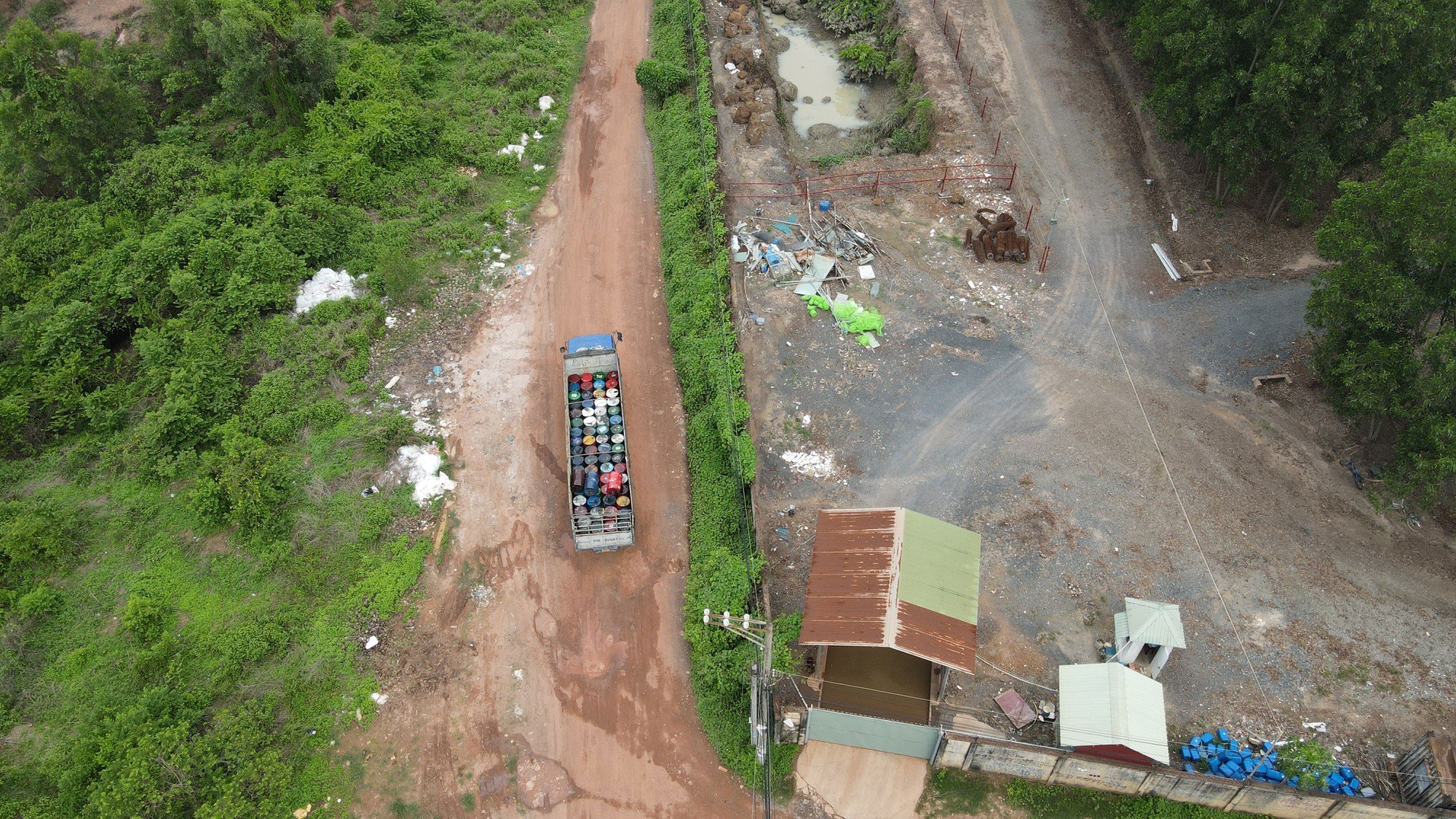
A truck carrying 67 barrels of used oil sold to Mr. Quang's facility on Song May 4 Street
Previously, at 9:00 a.m. on May 11, a truck with license plate 60H-046.xx carrying many drums of used oil also entered Song May 4 Street. The truck then passed through the gate marked "No entry in military zone" without encountering any obstacles. Arriving at the oil refining facility, the driver honked the horn to signal the people inside to open the door. When the truck entered, the gate was immediately closed, and the oil refining facility's staff loaded the drums of used oil (200 liters/drum) into storage. Notably, on many days, reporters also recorded many trucks (with license plates 60C-337.xx, 51C-766.xx, 51C-811.xx, 60C-345.xx, 76C-113.xx, 60C-167.xx, 61C-020.xx...) regularly supplying used oil to oil refineries on Song May 4 Street.
Returning to the above mentioned waste oil supply, at around 11:00 on May 11, truck BS 60H-046.xx was carrying empty drums. We followed and discovered that this truck was driving towards a waste oil collection point (in Group 10, Tan Cang Hamlet, Phuoc Tan Ward, Bien Hoa City). Inside the collection point, 2 men opened the truck's trunk and unloaded the empty iron drums. At the same time, 2 motorbikes were carrying 10 plastic cans (30 liters/can) of thick waste oil, and were driving to sell to the collection point.
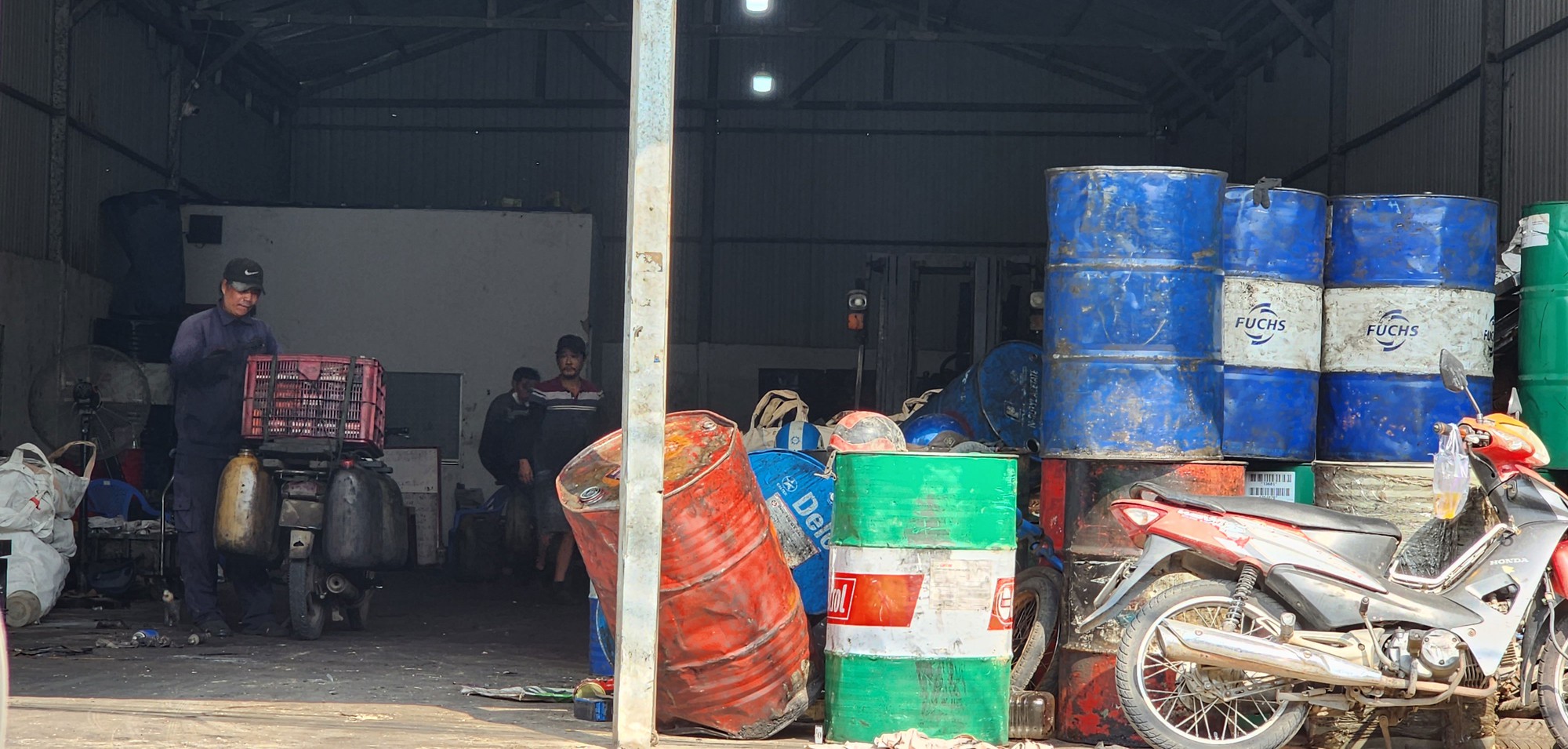
A man over 40 years old carried 10 cans of used engine oil to sell to the used engine oil collection point in Phuoc Tan Ward (Bien Hoa City).
After many days of monitoring, reporters recorded that every day, about a hundred motorbikes from the factory poured out to repair shops and industrial parks in Dong Nai, Binh Duong, and Ho Chi Minh City to collect waste oil. The collected waste oil was put into iron drums. After collecting enough goods, these people used forklifts to move the drums onto trucks, then continued to deliver them to the oil refinery.
The inside of this factory is extremely dirty, with used oil spilled all over the floor, blackening the floor, and giving off a pungent stench. There are hundreds of uncovered barrels (200 liters/barrel) piled up around. This poses a potential risk of fire or explosion.
Also following another truck is a regular source of waste oil for the TCDNTL facilities on Song May 4 Street. The reporter discovered a waste oil collection point, with an area of about 500 m2 , located at the foot of Phu Long Bridge (Ha Huy Giap Street, Thanh Xuan Ward, District 12, Ho Chi Minh City). Every day, there are about 10 large and small trucks and dozens of motorbikes coming to sell waste oil.
At 9:00 a.m. on May 24, in just about an hour, reporters recorded 2 trucks and 4 motorbikes (300 liters/vehicle) coming in to sell used oil. For motorbikes, the process of receiving used oil took about 10 minutes and for trucks, it took about 30 minutes.
MANY POTENTIAL DANGERS
After many days of monitoring, the reporter recorded that the entire process of collecting used oil by the "henchmen" and at the above-mentioned used oil collection points was carried out spontaneously, manually, without protective gear. This process of collecting used oil shows signs of violating environmental regulations, requirements for storage, trading, and management of hazardous waste according to the Law on Environmental Protection. In addition, these facilities do not ensure fire prevention and fighting work.
It is not difficult to detect and handle the illegal collection of used oil, because this activity takes place openly and for a long time. In addition, motorbike repair shops, industrial parks, etc. also actively sell used oil even though this substance is in the list of hazardous waste and the lack of control over this waste source is the source of illegal oil production.
Talking to reporters, Mr. Thinh (owner of a long-standing chain of motorbike repair shops in Bien Hoa City) said that in the past, after changing used engine oil for customers, it was poured into plastic cans, then transferred to the environmental company for treatment according to regulations. "Every time I pour used engine oil like that, I have to spend extra money for the unit to transport the engine oil for treatment. On average, each shop changes 15-20 oil bottles/day, the amount of used engine oil is equivalent to about 20 liters/day. However, in recent years, I do not need to spend money on dumping used engine oil, on the contrary, I have an additional income of more than 3 million VND/month. The used engine oil is changed in the morning and in the afternoon, someone comes to buy it for 4,000 VND/liter, very convenient," said Mr. Thinh.
Similarly, Mr. Dung (52 years old, living in Thu Duc City, owner of several motorbike repair shops in Ho Chi Minh City) said that every day dozens of people driving motorbikes and trucks come to the shop to ask to buy used engine oil.
Posing as someone looking for a source of used oil for recycling, at noon on a day at the end of May 2023, the reporter approached a male driver who had just provided a truckload of used oil to Mr. Duc's oil refining facility on Song May 4 Street.
The male driver said that every day (morning and afternoon), his minions will go to all the repair shops in Dong Nai, Binh Duong, Ho Chi Minh City, Long An, buy used engine oil at 4,000 VND/liter, and sell it back to the collection point at more than 6,000 VND/liter. After collecting enough, the used engine oil is put into barrels and sold back to the illegal oil refining facility.
Contacting a centipede, Mr. Hung (52 years old, living in Bien Hoa City), he said that every day, he uses a motorbike to collect used oil from motorbike repair shops in Bien Hoa City and some neighboring provinces. On average, Mr. Hung collects 100 - 200 liters of used oil per day at a price of 4,000 VND/liter. The used oil is stored at his house, and when he collects about 1,000 liters, he uses a three-wheeled vehicle to transport it to sell directly to Ms. DTKTh's TCDNTL facility (behind the cemetery, Long Binh Ward, Bien Hoa City) at a price of 6,500 VND/liter, making a profit of 2,500 VND/liter.
During the previous investigation, the reporter was told by the owner of a TCDNTL facility (on Song May 4 Street) that this facility needs a large, regular supply of used oil to reprocess finished oil. "I buy all the used oil brought here, at a price of 6,000 VND/liter. Depending on the time, the price may increase or decrease," this person said... ( continued )
According to Decree 155/2016/ND-CP, which regulates administrative sanctions in the field of environmental protection, the act of transferring, giving, buying, or selling hazardous waste to organizations or individuals without a license to handle hazardous waste can be fined from 10 to 250 million VND. A fine of 200 to 250 million VND will be imposed for the act of recycling, treating, or recovering energy from hazardous waste without the approval of a competent authority or without the content in the hazardous waste source owner registration book.
Source link










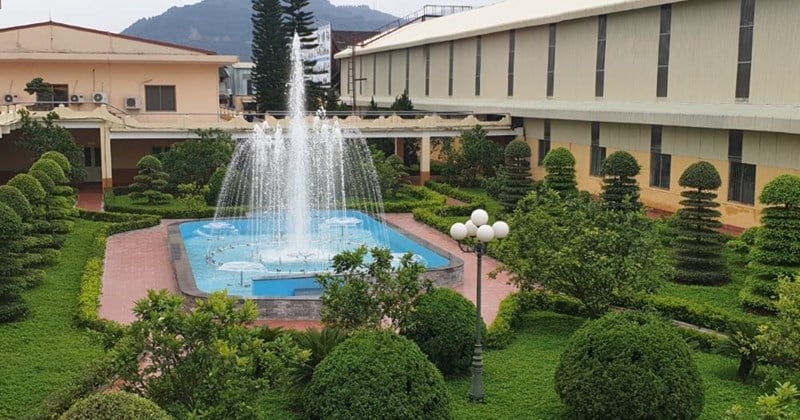

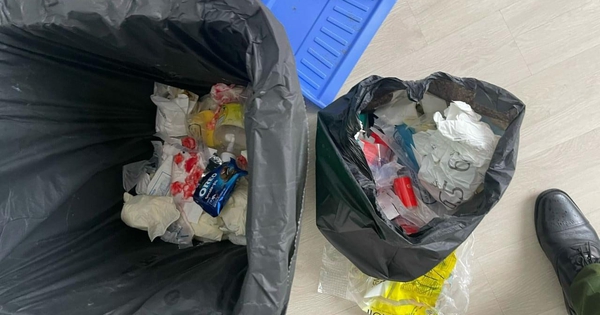
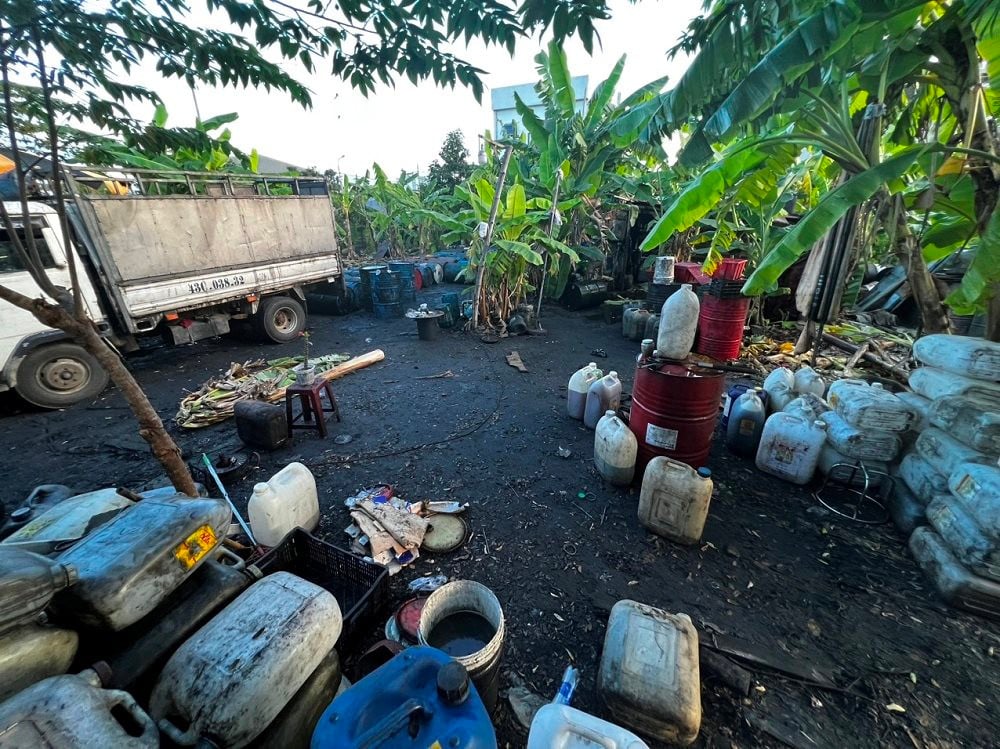
























![[Photo] Prime Minister Pham Minh Chinh chairs Government Conference with localities on economic growth](https://vstatic.vietnam.vn/vietnam/resource/IMAGE/2025/2/21/f34583484f2643a2a2b72168a0d64baa)

























































Comment (0)